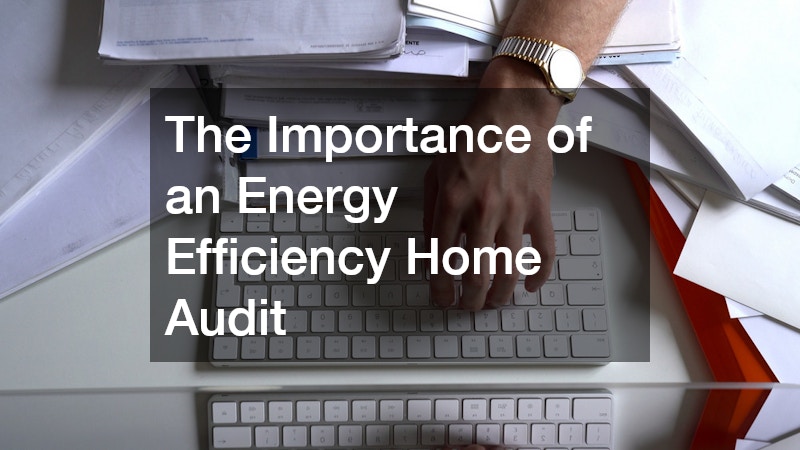
In today’s world, energy efficiency is not just a buzzword but a critical component of sustainable living. By conducting energy efficiency home audits, homeowners can not only save on energy costs but also contribute positively to the environment.
Energy efficiency home audits provide a thorough examination of a home’s energy use and pinpoint areas that require optimization. Moreover, these audits pave the way for implementing energy-saving measures that can lead to substantial long-term savings.
These audits have become increasingly significant as they play a crucial role in reducing greenhouse gas emissions and decreasing the carbon footprint of residential areas.
What is an Energy Efficiency Home Audit?
Definition and Purpose
An energy efficiency home audit is a meticulous evaluation of a home’s energy consumption patterns and systems. Its primary objective is to identify inefficiencies and recommend actionable improvements for homeowners.
This audit serves as a foundational step towards achieving a more energy-efficient home. It involves a comprehensive check of heating and cooling systems, insulation, and more.
The goal is to enhance the overall energy performance of a residential property, leading to both economic and environmental benefits.
Who Conducts the Audit?
Energy efficiency home audits are conducted by professionals known as energy auditors. These experts typically hold certifications like the Building Performance Institute (BPI) or the Residential Energy Services Network (RESNET) certification.
They are trained to use specialized equipment to diagnose energy-related issues accurately. Their expertise ensures homeowners receive valid and effective recommendations for improvement.
Hiring certified professionals ensures the audit is thorough and reliable, providing peace of mind for homeowners looking to make impactful energy-saving decisions.
How Does an Energy Audit Improve Home Efficiency?
Identifying Energy Leaks
Energy audits involve a detailed assessment of a home’s structure to locate areas where energy escape is possible. This process typically includes inspecting windows, doors, and insulation for any inefficiencies.
Technologies like infrared cameras and blower doors are used to detect leaks and air infiltration points in the building envelope. These tools help auditors provide a comprehensive analysis of where energy loss occurs.
Identifying these leaks forms the basis upon which solutions can be tailored to mitigate energy loss, improving overall energy efficiency.
Recommendations for Improvement
Following an energy audit, homeowners receive a set of detailed recommendations aimed at enhancing energy efficiency. These may include upgrading insulation, sealing air leaks, or installing energy-efficient windows.
Recommendations often extend to updating appliances with Energy Star-rated models and optimizing the use of heating, ventilation, and air conditioning (HVAC) systems. Implementing these changes is key to reducing energy bills and improving comfort within the home.
Auditors may also suggest behavioral changes, such as adjusting thermostat settings and using LED lighting, which can contribute to significant energy savings over time.
What Are the Benefits of an Energy Efficiency Home Audit?
Cost Savings
Energy audits pave the way for significant cost savings by identifying and suggesting remedies for energy inefficiencies. By acting on audit recommendations, homeowners can experience a reduction in utility bills by up to 30%.
These savings accumulate over time, offsetting the initial cost of the audit and energy efficiency improvements. Moreover, energy-efficient homes often have higher property values, providing additional financial benefits.
Investing in energy efficiency is a smart economic decision for the long-term financial health of households.
Environmental Impact
Energy-efficient homes significantly contribute to reducing carbon emissions and conserving natural resources. By using less energy, homeowners aid in minimizing their carbon footprint and promoting environmental sustainability.
The reduction in energy consumption translates to a lesser demand on power plants, which often rely on fossil fuels. This decrease in demand can lead to less pollution and a positive impact on climate change.
Through energy audits, homeowners not only benefit personally but also contribute to broader environmental goals.
How Often Should You Conduct an Energy Audit?
Frequency of Audits
It is generally recommended to conduct an energy efficiency home audit every three to five years. However, this can vary depending on factors like the age and condition of the home.
Homes with new systems or recent renovations might not require frequent audits compared to older homes with outdated systems. Regular audits ensure that homes remain energy efficient as systems age and energy-use patterns change.
Keeping up with regular audits maximizes energy efficiency and ensures continued cost savings over time.
Signs Your Home Needs an Audit
Certain signs can indicate the need for an energy audit, such as unexpected increases in utility bills. Drafts, uneven temperatures across rooms, and excessive dust accumulation can also be indicators.
If a home is more than ten years old and hasn’t undergone an energy audit, it’s wise to consider one. Additionally, before significant home improvements or when purchasing a new home, an energy audit provides valuable insights.
Addressing these signs early through an audit can prevent larger energy expenses and discomfort in the future.
How to Prepare for an Energy Efficiency Home Audit?
Gathering Necessary Information
Before an energy efficiency home audit, homeowners should compile documentation, such as utility bills from the past year. This information helps auditors understand historical energy usage patterns.
It’s also beneficial to document and share any previous energy improvements with the auditor. Providing information about square footage, age of appliances, and insulation levels can assist in a more efficient evaluation.
Well-prepared homeowners can facilitate a thorough and efficient audit process, ensuring all relevant areas are evaluated.
What to Expect During the Audit
During the audit, homeowners should expect auditors to use specialized tools, such as infrared cameras and blower doors, to identify issues. The process typically lasts a few hours, depending on the size and complexity of the home.
Auditors will inspect the home thoroughly, including basements, attics, and outside areas, for potential points of energy loss. After the audit, they will provide a detailed report with findings and recommendations for improvement.
Understanding what to expect helps homeowners facilitate the process and prepare for post-audit improvements effectively.




